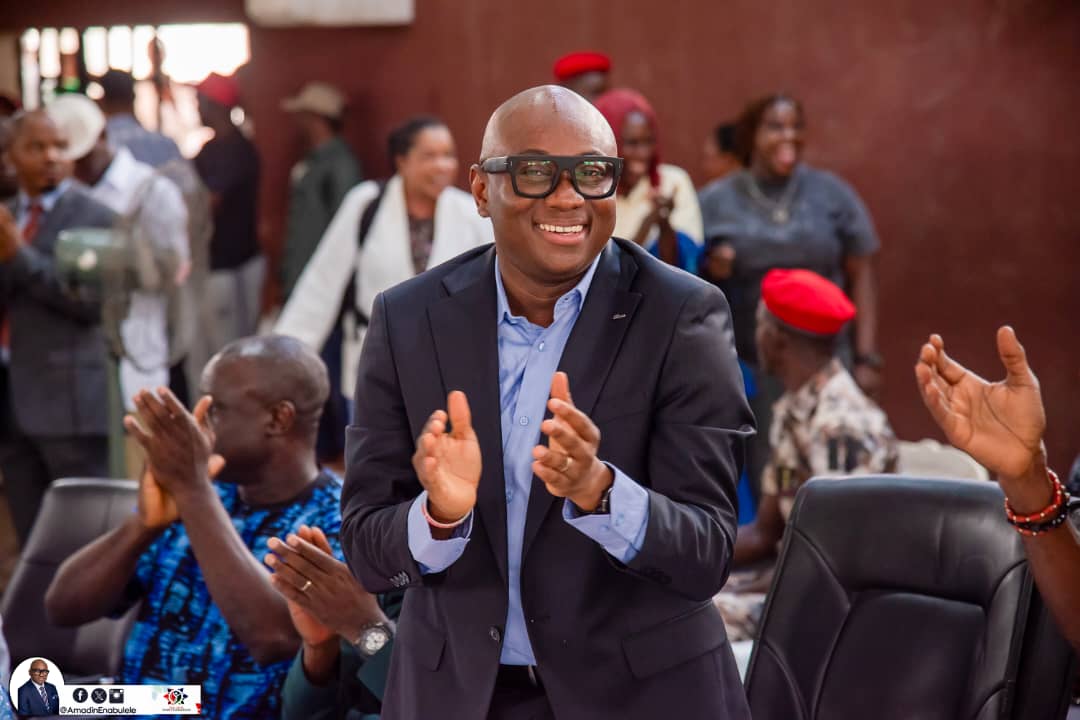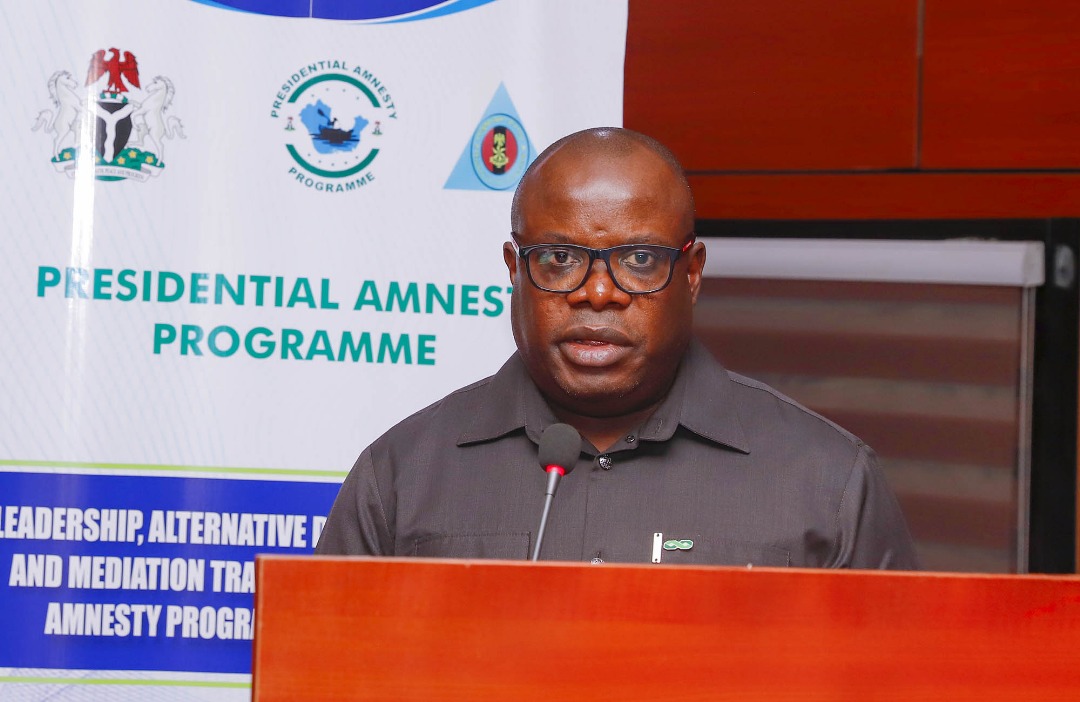News
Reintegrating Terrorists Into Society Dangerous, Ex-soldiers Tell FG

Some retired soldiers have again warned the Federal Government to be careful with its decision to rehabilitate and reintegrate some repentant terrorists who have gone through the government’s deradicalisation programme, Operations Safe Corridor.
The OSC which began under former president Muhammadu Buhari has run for several years and seen no fewer than 4,000 ex-Boko Haram members go through the programme.
In Gombe State alone, for instance, in September 2023, no fewer than 2,168 ex-Boko Haram members were said to have passed through the De-radicalisation, Rehabilitation and Reintegration camp at the Kwami Local Government Area of Gombe State in the last eight years.
In January 2023, no fewer than 613 rehabilitated terrorists undergoing de-radicalisation were scheduled to be handed over by the military authorities to their respective state governors.
However, in July 2022, some repentant Boko Haram members, despite renouncing their membership of the terror group, were accused of having contact with their former colleagues, supplying them intelligence.
READ ALSO: Pandemonium In Kaduna As Police, Shiite Members Clash
The former terrorists were said to be among the 800 persons who were recently reintegrated into the Bama community in Borno State and were resettled at the Government Girls’ Secondary School Bama.
Some of them were also accused of acting as spies for terrorist groups in the past.
Reacting on the matter, a retired colonel, Hassan Stan-Labo, stated, “If we have mobilised and brought them (terrorists) out for rehabilitation, it is already too late; there is nothing we can do but to go the whole hog; go through the entire demobilisation, de-radicalisation and rehabilitation.
“However, if I were the commander-in-chief, my instructions would have been: ‘Don’t bring anybody for any damn rehabilitation; you bloody well will pay the price for whatever you have done on the battle front’.
READ ALSO: Band A Customers Decry Extortion By Power Firms Amid Poor Supply
“You want a battle, come get the battle. You have committed all kinds of atrocities and now, you turn around begging for forgiveness. We don’t have a responsibility to forgive you; we hasten your journey to heaven. Go and meet God and ask for penance. What do we tell the people in the displaced persons camps, who are not even getting the kind of treatment we are giving these guys?”
He also asked that proper biometrics should be taken of these guys so they would not find their way into the military.
“We can have the biometrics of these guys and since fingerprints are used in the course of recruitment, we should be able to fish out those who may want to join the military. If we have a very effective intelligence network on the ground, this wouldn’t happen. I’m also aware that the Borno State Government is documenting their biometrics data. That’s a very good starting point,” he added.
Another retired military officer, who served in the Nigerian Navy but refused to be named, said it was wrong to assume that terrorists would repent because the government made them go through a programme.
READ ALSO: What Nigerians In US, Canada, Mexico Should Not Do During Solar Eclipse In April 8
“We are talking of hard criminals who kill innocent people for a living and leave families deserted. They destroy people’s livelihoods and feel nothing. Why will a few months or years programme deradicalise them? What was the government thinking when it said it wants to reintegrate them back into the society to live with the same people whom they rendered homeless? The government needs to have a clear rethink. No terrorist should be treated with kid’s gloves,” the soldier added.
Also speaking, a former director of the Department of State Services, Mr Mike Ejiofor, said the rehabilitation programme seemed not well-thought-out and ill-timed.
He said, “The government has been releasing some of them under the notion that they have been de-radicalised. These same people will go back into the society and start wreaking havoc. I think the government should reconsider its stance on the release of de-radicalised insurgents to avoid reintroducing criminals into the society.
“You can’t continue to release them in the heat of the problems when none of the people that have been arrested has been successfully prosecuted to serve as deterrent to others. Since they are not prosecuted, they are not afraid of going back to their old way.”
PUNCH
News
Former Delta North senator Peter Nwaoboshi Dies

Peter Nwaoboshi, the former senator representing Delta north, is dead.
Details of the circumstances surrounding his death were unclear at the time of this report, but according to reports, the former senator died in Abuja on Friday, aged 68.
In a statement, Sheriff Oborevwori, governor of Delta, expressed “profound grief” over the demise of the former lawmaker.
The governor described his demise as a monumental loss to the state, the Anioma nation, and Nigeria.
READ ALSO:Woman Taken For Dead Wakes Up Inside Coffin Few Minutes To Her Cremation
In a condolence message signed by Festus Ahon, his chief press secretary (CPS), Oborevwori hailed the late Nwaoboshi as a dedicated son of Delta and a bold champion of Anioma interests, whose legacy in nation-building will endure.
The governor said the late senator’s distinguished tenure in the national assembly, particularly as chairman of the senate committee on Niger Delta affairs.
“Nwaoboshi lived a life of service to his people, his party, and the country, bequeathing a heritage of bravery, loyalty, and commitment to public duty,” Oborevwori said.
READ ALSO:Fourteen Nigerian Banks Yet To Meet CBN’s Recapitalisation Ahead Of Deadline
“On behalf of the Delta State government and people, I mourn my dear friend, Senator Peter Onyelukachukwu Nwaoboshi.
“I extend deepest condolences to his family, the Anioma people, members of the All Progressives Congress, and everyone touched by his life.
“May God grant his soul peaceful rest and comfort to all who grieve this irreplaceable loss.”
News
Grassroots To Global Podium: Edo Sports Commission Marks Enabulele’s First Year In Office

The Indoor Sports Hall in Benin City came alive on Wednesday as the Edo State Sports Commission rolled out the drums to celebrate the first anniversary in office of its Executive Chairman, Hon. Amadin Desmond Enabulele. Management, staff, coaches and athletes gathered in an atmosphere charged with pride, reflection and optimism.
The colourful ceremony drew executives and members of various sports associations, officials of the Sports Writers Association of Nigeria (SWAN), coaches, athletes and other key stakeholders in Edo sports.
In her welcome address, the Acting Permanent Secretary of the Commission, Mrs. A. P. Amenze, praised Hon. Enabulele for what she described as focused and purposeful leadership. She said the past year had seen renewed confidence, discipline and energy return to the state’s sports ecosystem.
Adding excitement to the event were exhibition bouts and demonstrations by the Kung Fu, Karate, Taekwondo and Judo associations, staged in honour of the Executive Chairman.
READ ALSO:2025 NYG: Enabulele Charges Edo Coaches On Performance
Speaking for SWAN Edo State, Chairman Comrade Kehinde Osagiede commended Hon. Enabulele’s open-door leadership style and consistent support for sports development. He noted that the Commission had effectively driven Governor Monday Okpebholo’s “Catch Them Young” policy through practical grassroots programmes that identify and groom young talents across the state.
In recognition of his contributions to sports development and media relations, Comrade Osagiede conferred the Patronship of SWAN Edo State on Hon. Enabulele and presented him with a special anniversary card.
Goodwill messages followed from Executive Directors of the Commission, including Hon. Frank Ilaboya (Edo North), Coach Baldwin Bazuaye, MON (Edo South), Barr. Anthony Ikuenobe (Edo Central), and Mrs. Sabrina Chikere, Executive Director, Sports Development and Operations. Representatives of coaches, athletes and sports associations also took turns to acknowledge the progress recorded under the current leadership.
In his stewardship address, Hon. Enabulele expressed gratitude to Governor Monday Okpebholo and Deputy Governor Rt. Hon. Dennis Idahosa for the trust placed in him, noting that their backing and shared vision had driven the Commission’s achievements.
READ ALSO:Enabulele Lauds Okpehbolo For Creating Enabling Environment For Football To Thrive
He highlighted Team Edo’s third-place finish at the 9th National Youth Games in Asaba, where the state recorded its best-ever outing with 79 medals—33 gold, 18 silver and 28 bronze—reinforcing Edo’s reputation as a national sports powerhouse.
The Chairman also pointed to the impact of inclusive and grassroots sports programmes, citing Favour Ojeabu, a visually impaired para-cyclist who won three gold medals to emerge Africa’s champion at the African Track Para-Cycling Championship in Egypt.
Other milestones listed included outstanding performances by Edo para powerlifters on the international stage, historic achievements in cricket, weightlifting, cycling, judo and deaf athletics, as well as structural reforms such as the repositioning of Bendel Insurance FC and deeper investment in grassroots sports development.
Cultural performances added colour and tradition to the celebration, as stakeholders closed the event united in their assessment of the past year as a truly transformative period for sports development in Edo State.
News
Otuaro Tasks Media On Objective Reportage

The Administrator, Presidential Amnesty Programme (PAP) Dr. Dennis Otuaro has charged media practitioners particularly members of the Ijaw Publishers’ Forum to promote ethical journalism through their reportage.
He gave the charge in Warri on Wednesday during the 2nd Annual Ijaw Media Conference organised by the Ijaw Publishers’ Forum (IPF).
Represented by Princewill Binebai, spokesman, Ijaw Youth Council (IYC) Worldwide, Otuaro while stating that the Niger Delta stories have been told in such a way that is quite different from what is obtainable in the real sense, said this, IPF must do everything possible to correct.
The administrator added: “I am happy that Ijaw journalists have boldly come out together to champion the Ijaw struggle in a very dynamic perspective”.
READ ALSO:IPF Hosts Media Conference, Seeks Protection For N’Delta Environment
“The Ijaw story was misrepresented over the years, but IPF’s emergence had corrected this error and the story is gradually changing for better.”
Otuaro, however, challenged Ijaw media practitioners to be objective, truthful, accurate and fearless in their reportage to correct many years anomalies of the Ijaw struggle.
He admonished members of IPF to see themselves as brothers and love one another in the discharge of their activities to achieve a common goal.

 Metro4 days ago
Metro4 days agoSuspected Kidnappers Abduct 18 Passengers On Benin-Akure Road

 News4 days ago
News4 days agoI’m Not Distracted By Anti-Niger Delta Elements, Says PAP Boss, Otuaro

 News4 days ago
News4 days agoOPINION: Time For The Abachas To Rejoice

 News5 days ago
News5 days agoEdo Assembly Charges Contractor Handling Ekekhuan Road To Accelerate Work

 Sports3 days ago
Sports3 days agoJUST IN: Dembélé Named FIFA Best Men’s Player, Bonmatí Wins Women’s Award

 News3 days ago
News3 days agoWage Dispute: Court Orders PSG To Pay Mbappe €61 Million

 Metro4 days ago
Metro4 days agoNDLEA Seizes 457kg of Cannabis, Arrests Suspected Trafficker In Edo

 Headline3 days ago
Headline3 days agoAircraft Crashes In Owerri With Four Persons Onboard

 News4 days ago
News4 days agoEx-Nigerian Amb., Igali, To Deliver Keynote Address As IPF Holds Ijaw Media Conference

 Business3 days ago
Business3 days ago9th FirstBank Digital Xperience Centre Launched In UNIBEN
































